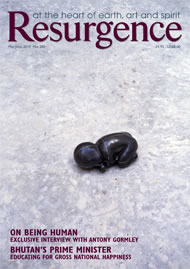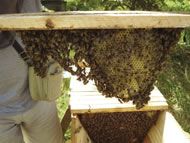Barefoot is now synonymous with all things back to basics, and Phillip Chandler’s latest edition of his book The Barefoot Beekeeper is essentially a down-to-earth ‘how-to’ manual, written to help new or established beekeepers in the creation and maintenance of the ingenious top bar hive: a beautifully simple, low-impact, low-cost alternative to the mass-produced framed hives we see in our countryside, towns and cities. Brilliant in its simplicity, the book also provides an explanation for and possible solution to the global Colony Collapse Disorder currently wreaking havoc on bee populations across the planet.
Chandler presents a compelling take on the declining bee populations. Pesticides, he suggests, are clearly a main culprit, along with the heavy-handed way in which so many bees are forced to produce honey for us. It seems we are now reaping the whirlwind of consequence.
“The primary aim in writing a book about ‘barefoot beekeeping’ is to challenge the status quo and to stimulate both actual and potential beekeepers to think for themselves and to ask more questions,” Chandler writes. He achieves this goal both thoughtfully and passionately, taking us through a brief but fascinating history of beekeeping and its complex local and global politics.
Chandler is clearly a man on a mission and not averse to challenging long-held, established views on the keeping and the farming of bees throughout the world. He does this with vigour, conviction and clarity and I would be surprised to find a convincing counter to his argument for the urgent need for a radical shift in our approach to bees and beekeeping. (No sane mind could really believe that maintaining the current mass agricultural approach to beekeeping is a good idea.)
The Barefoot Beekeeper stresses the im-portance for beekeepers to keep searching for information on beekeeping methods using intelligence, intuition and absolute respect for the bees in finding the most sustainable way to keep them. It is now abundantly clear to me that ultimately we need to be in service to the bees and that in truth they keep us alive with their ceaseless pollination of so much of what we eat to survive.
There are few, if any, criticisms save the overall design of the book. The book itself would benefit from downsizing from the academic and unwieldy current A4 to closer to A5. This would no doubt reduce production and carbon footprint costs too. And while there were diagrams for some of the more complex hive construction techniques, these were too few for my liking. More instructive pictures in the next edition, please!
It strikes me this is an important work and one that, with a redesign, could be reproduced on a commercial scale as a fresh, inspiring approach to beekeeping and as one possible solution to the current bee crisis.
Chandler has laid down an emotive and practical gauntlet to the conventional ‘wisdom’ on beekeeping. He doesn’t claim to be an expert, but he has clearly done his homework. He is a man captivated by the ecology, psychology and essential nature of bees and is a strident champion of their current dilemma and their right to be left to do what they have done so successfully for millennia with minimal interference from us.
He offers commonsense alternatives to the current systems upheld by many beekeepers (both commercial and non-commercial) and encourages us to question everything we hear and see about current beekeeping practice. He believes we can gain great insight and pleasure from studying, respecting and working with bees to develop a fruitful, symbiotic relationship with these remarkable creatures. And if we’re lucky, if we work hard enough, long enough and with great respect, we just might earn the ultimate bonus in the shape of a jar of prized, and much loved, organic honey.
If like me, you sometimes feel powerless in the face of the sheer scale of humankind’s destructive impact on our planet, wondering how on earth you could make a difference, then The Barefoot Beekeeper may provide you with one inspiring, practical solution to nourish the bees and help rekindle our damaged local ecosystems. I imagine in the near future this heartfelt and practical book will be seen as essential reading.
It already is for this reader.







